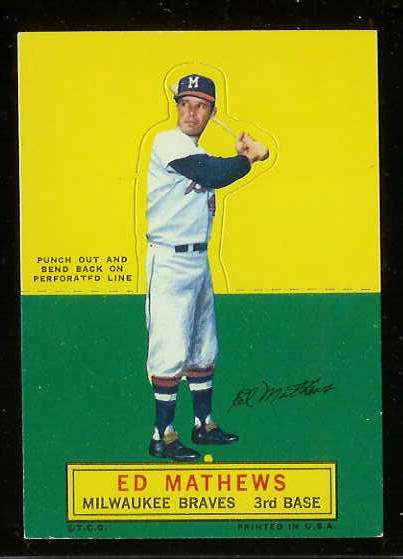| FREE |  |
(10) NM/MINT Vintage Hall-of-Famers click for details |
 |
FREE |
| FREE |  |
(10) NM/MINT Vintage Hall-of-Famers click for details |
 |
FREE |
| USE BACK ARROW TO RETURN TO PRIOR PAGE |
1964 Topps Stand-Ups/Standups - Eddie Mathews SHORT PRINT (Braves)Book = $ *BOOK* Price = $ 0 |

|
Search for another sportscard using the search box below
or click on banner at top to visit our Baseball Cards store.
|
Below are short bits & pieces on sportscard & baseball trading card collecting. Please wander around the website for more info, prices, values & images on vintage baseball, football, basketball, hockey, sport and non-sports cards. 



Baseball card collecting terms (part C)
Cabinet Card Were oversized trading cards featuring paintings issued mostly 1910-1915. Card Show is a gathering of dealers & collectors looking to buy/sell/trade sports cards and memorabilia. Card Stock is the material a card is printed on. Usually paper-based, today companies play with the card stock and sometimes it appears to be wood or leather or see-thru acrylic ... Cello Pack is a card pack whose wrapper is see-thru plastic. Usually the top & bottom cards are seen. Unopened cello packs showing major stars and rookies sell for heavy premiums. Centering is the balance of the borders: top/bottom & left/right. On perfectly-centered cards, top/bottom borders match as do the left/right borders. Centering is presented as a set of numbers & directions and often included with the grade. Perfectly-centered is "50/50 t/b" AND "50/50 l/r". As centering gets worse, one number increases and the other decreases. For example: 90/10 t/b is considered extremely off-center top to bottom. The numbers add up to 100 (50/50, 60/40, 90/10 ...). Certificate Of Authenticity (COA) A document used to verify legitimacy of a collectible. NOTE: Keep in mind that COA's are easier to fake then autographs. Common A card of a non-star player is considered a "Common" as opposed to cards of a star players or specialty/subset cards such as league leaders, teams cards, World Series cards... Condition (Grade) Centering, corner wear, photo clarity, edges, creases, print flaws ... all combine to determine a card's condition or grade. Along with rarity/scarcity it is the major factor in a card's value. Crease Defect usually caused by bending the card. Hard to see, or not, a crease lowers the card's grade (VG or lower) and greatly diminishes it's value.
© 1995-2019 "InterNet's Baseball Card Store" / Joseph Juhasz ... All Rights Reserved |